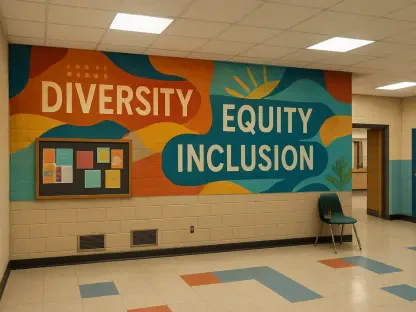In the ever-shifting terrain of modern education, principals find themselves at the forefront of navigating ethical dilemmas that are as diverse as they are daunting, from ensuring equitable treatment across varied student demographics to wrestling with the societal and moral implications of rapidly advancing technologies. These school leaders are tasked with making decisions that not only impact immediate school environments but also shape the moral fabric of future generations. Drawing on the profound insights of Natalie Charles, Principal of St Catherine’s School and a Fellow of the Vincent Fairfax Fellowship (VFF), this exploration sheds light on the pressing need for ethics to anchor leadership in schools. The challenges are multifaceted, involving equity, student well-being, regulatory adherence, and the ethical use of innovations like artificial intelligence. As guardians of educational integrity, principals must balance immediate pressures with long-term consequences, fostering communities that are resilient and prepared for an uncertain tomorrow.
The Bedrock of Ethical Leadership
School leadership today demands a steadfast commitment to ethical principles as the foundation for every decision made within the educational sphere. Natalie Charles advocates for a visionary approach, encouraging principals to ponder how their actions will be perceived by future generations. This mindset elevates decision-making beyond mere problem-solving to a form of legacy creation, where each choice sets a precedent for integrity and trust. Principals are not just administrators but moral exemplars who must demonstrate transparency in their actions, ensuring that their schools remain bastions of reliability amid societal uncertainties. By embedding ethics into the core of their leadership style, they create an environment where fairness and accountability are not just ideals but lived realities, influencing everything from policy implementation to daily interactions with students and staff.
Moreover, the role of ethics in leadership extends to inspiring a culture of moral courage within the school community, impacting both students and educators in profound ways. Charles emphasizes the importance of teaching students to navigate moral ambiguities by embracing discomfort and engaging with complex issues rather than seeking oversimplified answers often propagated by digital platforms. This approach prepares young minds for a world rife with nuanced challenges, encouraging them to think critically and act with principle. For staff, principals must foster an atmosphere where standing up for ethical beliefs, even under pressure, is supported and valued. Such an environment not only strengthens individual resolve but also builds a collective ethos of integrity, ensuring that the school as a whole can withstand external pressures while maintaining a focus on what is right over what is expedient.
Confronting Systemic and Societal Forces
The teaching profession, rooted in a deep sense of vocation, often faces systemic obstacles that can diminish educators’ sense of purpose and impact. Principals play a crucial role in counteracting these challenges by reconnecting staff with the ethical underpinnings of their work, as highlighted by Charles. When teachers grapple with socio-political dynamics or feel undervalued by broader systems, a focus on moral dimensions can reignite their passion for education. By facilitating discussions and initiatives centered on ethical practice, school leaders help educators rediscover the profound significance of shaping young lives. This renewed sense of mission acts as a buffer against burnout, fostering resilience and dedication even when external conditions are less than ideal, ultimately strengthening the educational community from within.
Additionally, the digital age presents unique ethical hurdles for principals, with technologies like artificial intelligence and social media reshaping the landscape at an unprecedented pace. These tools, while offering immense potential, often fragment shared understandings and amplify societal divisions, creating dilemmas that outstrip traditional frameworks of response. Charles argues for a return to collective humanity, urging principals to prioritize moral courage and critical inquiry over unchecked technological adoption. Schools must become spaces where the question of “should we” takes precedence over “can we,” ensuring that innovations align with ethical goals. This requires guiding both students and staff to critically assess the implications of digital tools, fostering a mindset that values human connection and responsibility above mere efficiency or novelty.
Shaping Tomorrow’s Ethical Leaders
A critical responsibility for principals lies in nurturing the next generation of leaders—students who carry the potential to transform society with optimism and authenticity. Drawing from her experiences with the Vincent Fairfax Fellowship, Charles underscores the need to empower these “little leaders” to believe in their capacity to drive meaningful change. In a climate often marked by cynicism and diminished trust, schools must serve as incubators of hope, encouraging active participation in bending the moral arc toward justice. This involves creating opportunities for students to engage in real-world problem-solving and ethical debates, equipping them with the confidence to challenge inequities and advocate for a better future, even when faced with daunting global issues.
Furthermore, the task of building future leaders requires principals to model and instill a deep sense of moral responsibility that transcends the classroom. By integrating ethical reasoning into curricula and extracurricular activities, schools can prepare students to tackle ambiguity and disagreement with maturity and empathy. Charles points to the importance of fostering environments where young people learn to value diverse perspectives while holding firm to principled stances. This balance is essential in a world increasingly shaped by polarized discourse, ensuring that tomorrow’s leaders are not only equipped to navigate complexity but also inspired to contribute to societal good. Principals, in this capacity, act as catalysts for long-term cultural shifts, embedding values that endure well beyond their tenure.
Pathways to Sustained Ethical Progress
Reflecting on the myriad challenges that principals encounter, it becomes evident that their role as ethical stewards has been tested like never before, demanding both introspection and bold action. The insights shared by Natalie Charles through her fellowship journey reveal how past efforts to prioritize fairness, well-being, and moral courage have laid crucial groundwork for resilient school communities. Looking ahead, the focus must shift to actionable strategies that embed ethics deeper into educational systems. Principals should champion ongoing professional development that hones ethical decision-making skills among staff, while also advocating for policies that support student mental health and equitable access to resources. Collaborative networks, inspired by frameworks like the Vincent Fairfax Fellowship, can offer vital support, enabling school leaders to share best practices and innovate together. By committing to these steps, the educational landscape can evolve into a space where ethical leadership not only addresses current dilemmas but also anticipates and mitigates future challenges.









